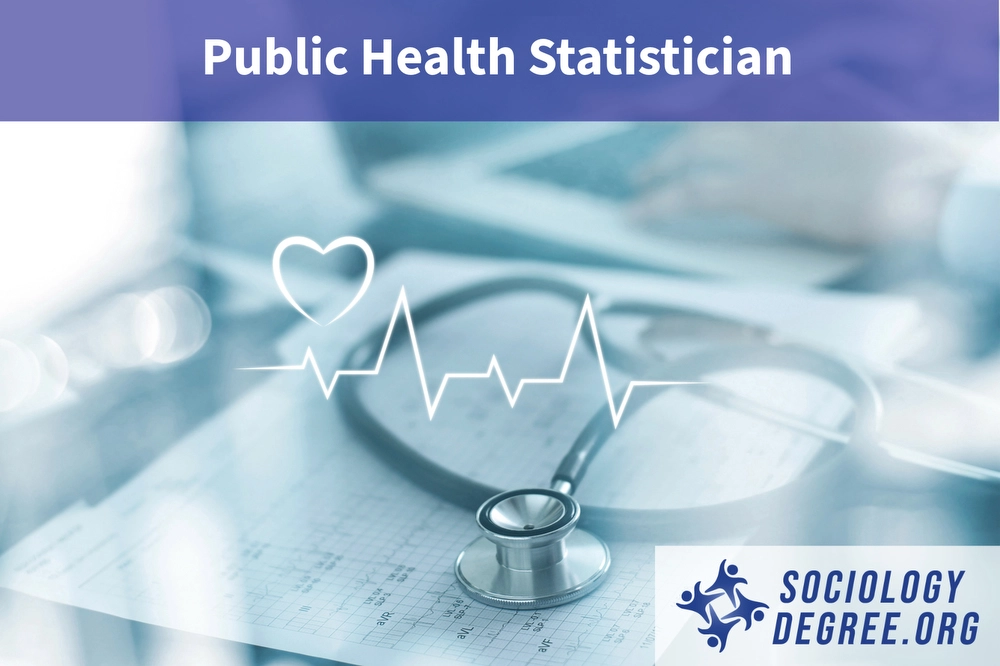A career as a public health statistician offers the opportunity to analyze health data, track disease patterns, and inform public health policies. Public health statisticians play a critical role in shaping health initiatives by providing research, statistical analysis, and data-driven insights to government agencies, healthcare organizations, and research institutions. A sociology degree provides an excellent foundation for this role by equipping graduates with skills in research, data interpretation, and understanding social determinants of health.
How to Become a Public Health Statistician
What is a Public Health Statistician?
A public health statistician is a professional who collects, analyzes, and interprets health-related data to improve public health outcomes. Key duties of a public health statistician include:
- Collecting and analyzing epidemiological data related to diseases, healthcare access, and health behaviors.
- Using statistical software to process large datasets and generate reports.
- Identifying trends in health disparities and social determinants of health.
- Assisting public health officials in designing research studies and surveys.
- Communicating statistical findings to policymakers, healthcare providers, and the public.
- Ensuring data accuracy, reliability, and ethical research practices.
Public health statisticians work for government agencies such as the Centers for Disease Control and Prevention (CDC), research institutions, healthcare organizations, and non-profit health advocacy groups.
2025 Best Online Bachelor's Degrees in Sociology
Why Get a Sociology Degree for a Public Health Statistician Career?
A degree in sociology is an ideal starting point for a career as a public health statistician. Sociology focuses on understanding social behaviors, health disparities, and research methodologies, making it highly relevant to public health data analysis.
Key reasons why a sociology degree is suitable for this career include:
- Quantitative and Qualitative Research Skills: Sociology programs emphasize data collection and statistical analysis, essential for public health research.
- Understanding Social Determinants of Health: Sociology explores factors such as socioeconomic status, race, and community environments that impact health outcomes.
- Statistical and Analytical Training: Many sociology courses include training in statistical software such as SPSS, R, or Python, which are essential for health data analysis.
To enhance their qualifications, students may pursue internships with public health departments, research organizations, or healthcare institutions.
Degree Pathways
A bachelor’s degree in sociology is a strong starting point for becoming a public health statistician, but additional education or training may be beneficial. Here are the typical educational pathways:
- Bachelor’s Degree in Sociology: A BA or BS in Sociology with coursework in statistics, epidemiology, and research methods provides foundational knowledge and skills.
- Master’s Degree in Sociology: A master’s in public health (MPH), biostatistics, or epidemiology can lead to advanced roles in health data analysis and research.
- Ph.D. in Public Health or Biostatistics: Higher-level research positions, leadership roles, and university teaching positions often require a doctoral degree.
Do I Need Any Credentials or Certifications?
While not always required, obtaining certifications can enhance employability and expertise in public health statistics. Common options include:
- Certified Health Data Analyst (CHDA): Offered by the American Health Information Management Association (AHIMA), this certification validates expertise in data analysis and healthcare statistics.
- Certified in Public Health (CPH): Offered by the National Board of Public Health Examiners (NBPHE), this certification demonstrates knowledge of public health principles.
- Data Analytics and Statistical Software Certifications: Training in statistical software (SAS, R, Python) and data visualization tools can be highly beneficial.
Public Health Statistician Salary
According to the U.S. Bureau of Labor Statistics (BLS), the median annual salary for statisticians, including public health statisticians, was approximately $96,000 in 2023. Salaries can vary widely based on several factors:
- Industry: Statisticians working for federal health agencies or research institutions typically earn higher salaries than those in non-profit organizations.
- Experience: Entry-level positions generally pay less than roles requiring extensive research experience.
- Education: Advanced degrees or certifications can lead to higher earning potential.
- Location: Urban areas or regions with a high concentration of healthcare and research institutions often offer higher salaries.
For additional salary information, visit https://www.sociologydegree.org/resources/salary/
Why a Sociology Degree is Ideal for a Public Health Statistician Career
A sociology degree offers a strong foundation for a fulfilling career as a public health statistician. By understanding population health trends, research methodologies, and data analysis, sociology graduates are well-equipped to analyze and interpret crucial health data. Combining academic training with relevant internships, certifications, and technical skills can position aspiring public health statisticians for success in this data-driven and impactful career.

